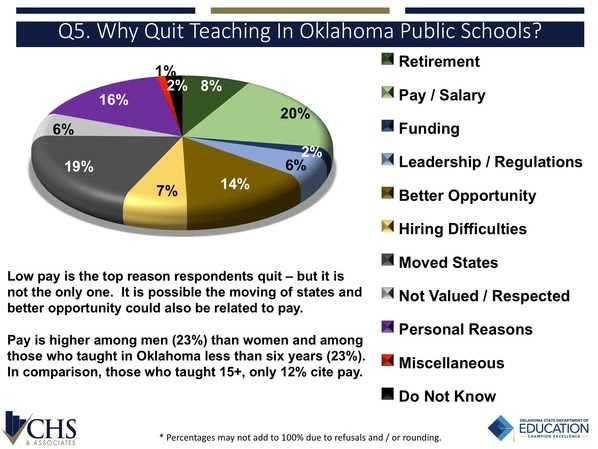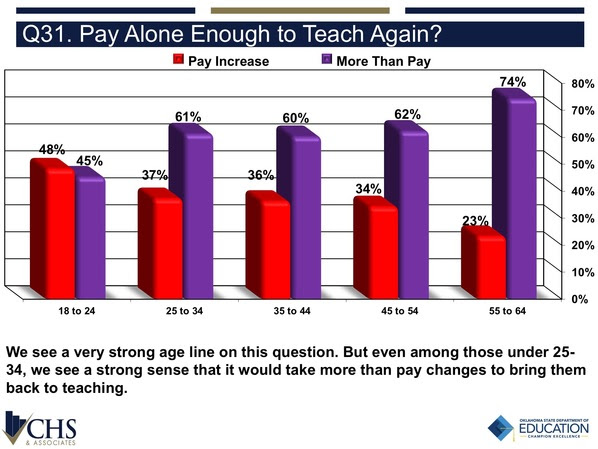For the last several years, the media has been faithfully reporting on the mass exodus of teachers from Oklahoma to nearby states for a larger paycheck. The given reason for the teacher shortage has been so prevalent, that we’ve almost unanimously agreed on it: give our teachers a raise.
To their credit the State legislators have been trying to make this happen. To their disdain, they’ve not been able to come to a solid agreement on exactly how it should happen.
Meanwhile, teachers continue to leave the Sooner State and emergency certifications are being given out like candy. Schools are scrambling to find substitutes.
Thankfully, just in case you were unsure, an official report released by the Oklahoma State Department of Education (OSDE) has come along and proven what everyone already knew: it’s all about the Benjamins. Well actually, it’s not, but we’ll get to that.
State Superintendent of Public Instruction Joy Hofmeister discussed the findings at a conference recently.
“As our state continues suffering the effects of an unprecedented teacher shortage, Oklahoma cannot afford to ignore the results of this survey,” Hofmeister said. “Pay is no cure-all to staving off this shortage, but without regionally competitive compensation, we are trying to win a home run contest with one arm held behind our back.”
First off, that’s about the worst sports analogy for this situation. Here’s a better one: Our all-stars are finding bigger and better contracts with other teams, while we try to run the game on nothing but pinch-hitters. And then we’re wondering why we’re not racking up any championships.
The media release that Sapulpa Times got for this survey seemed put a positive spin on one of the most daunting bits of data: 31 percent of the respondents indicated they would “likely return to the classroom if teacher pay were increased.”
Or put another way, almost 7 out of every 10 respondents said they wouldn’t return to Oklahoma classrooms even if we paid them, or at the very least, couldn’t say for certain they would.
This survey was sent to 30,000 emails, but only 7,546 responded. The results focused on the 5,487 respondents under the age of 65 with active teaching certificates who are not currently teaching in Oklahoma public schools. The large sample size yielded a margin of error of less than 1 percent.

But the problems don’t end with teacher pay. The survey reports that “significant number indicated that being unable to make decisions related to instruction and impediments to practicing the art of teaching were important factors in leaving the classroom.” The report also states a number of other factors cited by respondents – including inadequate education funding, hiring difficulties, relocating out of state and personal reasons – can also be related to matters of teacher compensation.
The majority of respondents felt that from their first year in the classroom to their last, the quality of the work environment had deteriorated rather than improved. Nearly half (48 percent) believed it had deteriorated a great deal.
As if trying to add insult to injury the largest percentage of those who said pay was a primary reason for leaving were special education and secondary teachers.
Hofmeister admitted that that particular factoid was not good news, saying she found it “alarming that our special education teachers are particularly pay sensitive, which does not bode well for serving our students with the greatest needs.”
The only other possibly surprising statistic was the correlation between pay sensitivity and age. Those under the age of 45 were more concerned about pay than older teachers. Forty-eight percent of respondents 18-24, 37 percent of those 24-34, and 36 percent of those 35-44 said that pay alone would be sufficient for them to return to the classroom.

Only in the age 18-24 category did more respondents indicate that pay alone, as opposed to more than pay, would bring them back to the classroom. Nonetheless, 31 percent of all those surveyed indicated that a pay increase would be sufficient to convince them to return.
If you’re interested in reading the report, click here.
What are we to take from these results? More than a simple “I told you so.” These teachers are telling us that we’re suffocating their ability to breathe creativity into their teaching experiences, and that they’re not getting the training, equipment and other funds to do so adequately. And on top of that we’re paying them chump change.
Our state need more than a teacher raise. We need a culture change in the entire idea of education. Maybe when we begin treating our teachers like the wonderful people they are, we’ll get to keep a few more of them.







